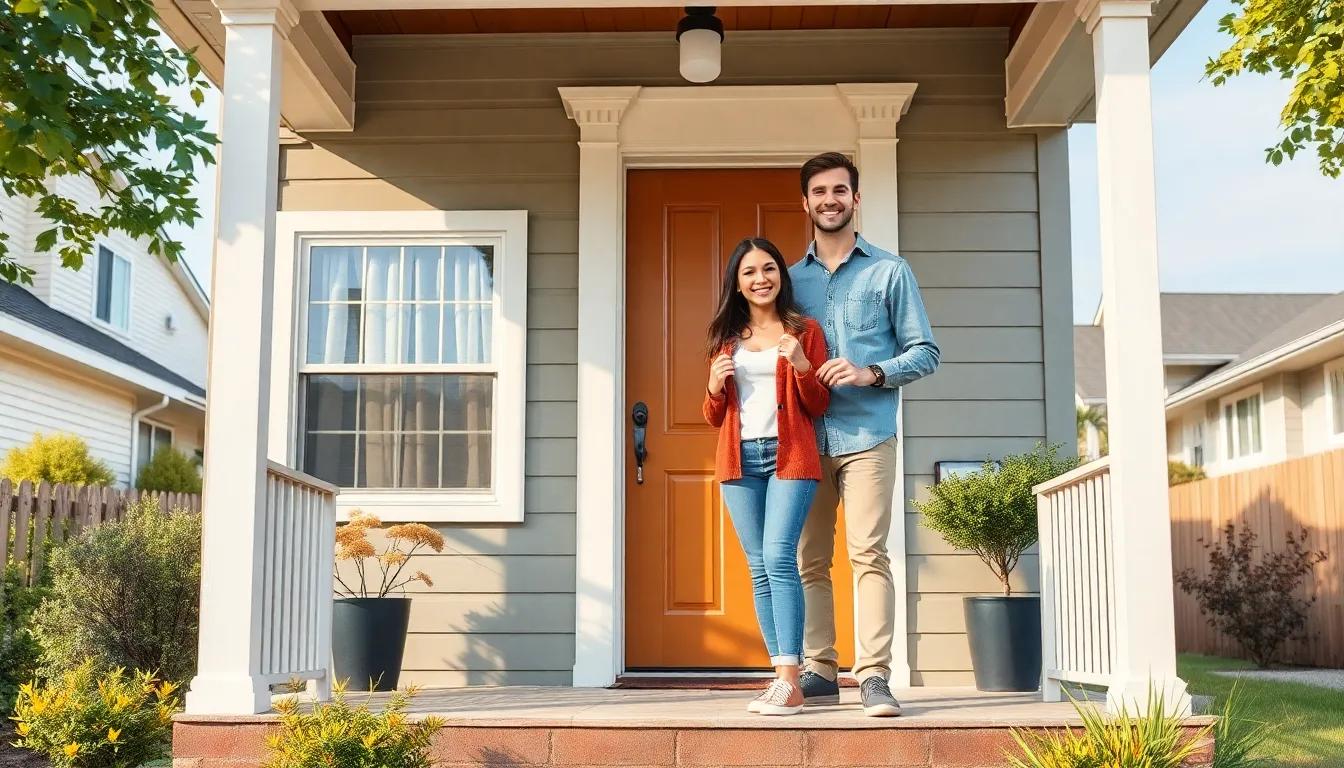Table of Contents
ToggleIn today’s housing market, the age-old debate of buying a starter home versus renting is hotter than a jalapeño in a sauna. With interest rates and rent prices dancing the cha-cha, potential homeowners find themselves at a crossroads. Should they take the plunge into ownership or stick with the flexibility of renting? It’s a question that can make even the bravest souls break out in a cold sweat.
Overview of Buying a Starter Home vs Renting
Choosing between buying a starter home and renting presents distinct advantages and disadvantages. Buying a home fosters stability; individuals can establish roots in a community. Homeownership contributes to potential equity growth. Many see it as a long-term investment.
Renting, on the other hand, provides flexibility. It allows individuals to relocate with ease, adapting to job changes or personal circumstances. Emergency repairs typically fall on landlords, reducing financial burdens for renters.
Current interest rates significantly affect the decision to buy. As rates rise, mortgage payments increase, impacting affordability. Rent prices also continue to climb, making long-term renting increasingly expensive.
Affordability remains a critical factor. Potential buyers may struggle to save for a down payment amid rising living costs. In contrast, renters may invest less upfront, making it easier to enter housing markets in the future.
Location choices influence the decision-making process. Urban areas often exhibit higher rent prices, while suburban and rural areas may offer more affordable home-buying options. Neighborhood amenities can sway preferences, with access to schools and public transport being key considerations.
Ultimately, the choice hinges on individual financial situations and personal goals. Assessing job stability, family planning, and lifestyle preferences proves essential for making an informed decision. An informed approach empowers individuals to weigh their options carefully before committing to either path.
Benefits of Buying a Starter Home

Buying a starter home offers numerous advantages that can reshape financial futures.
Building Equity
Homeownership allows individuals to build equity over time. As mortgage payments contribute to the principal balance, homeowners increase their ownership stake in the property. This accumulation of equity can serve as a financial resource, enabling access to loans for future investments or home improvements. Unlike renting, where monthly payments contribute solely to landlords, buying fosters long-term financial growth. Increased property value enhances equity, creating opportunities for homeowners to benefit financially through appreciation. Current real estate trends indicate that equity growth reinforces financial stability as homes often appreciate over time, making this a compelling reason to consider buying.
Stability and Predictability
Purchasing a home provides stability and predictability in housing costs. Fixed-rate mortgages guarantee consistent monthly payments, shielding homeowners from rent fluctuations. This predictability supports financial planning, allowing individuals to budget effectively without the fear of sudden rental increases. Homeownership cultivates a sense of community, offering a more permanent living environment than renting. Personalization of space becomes possible, allowing owners to make renovations that reflect their preferences. Long-term residence encourages deeper connections with neighborhoods, further enhancing the stability associated with homeownership. Stability brings confidence, making buying an appealing option for many.
Advantages of Renting
Renting offers unique benefits that appeal to many individuals facing housing decisions. Flexibility and lower upfront costs are two significant advantages to consider.
Flexibility and Mobility
Renting allows for greater flexibility in living arrangements. Individuals can relocate without the constraints of selling a property. This mobility suits those with jobs requiring frequent moves or changing life circumstances. Many renters appreciate the ease of moving to new neighborhoods or cities as their needs evolve. Short-term leases permit residents to test different locations without long-term commitments. Renters can quickly adapt to lifestyle changes, such as marriage, job transitions, or education. Overall, this adaptability keeps options open for future opportunities.
Lower Upfront Costs
Lower upfront costs represent another compelling advantage to renting. Renters typically face smaller initial expenses compared to homebuyers. Security deposits and first-month rent often represent the primary financial commitment. Homebuyers usually must save for down payments, which can average between 5% and 20% of the purchase price. Additionally, renters avoid other costs, such as property taxes and homeowners insurance, which homeowners incur regularly. This financial accessibility allows people to enter housing markets with less burden. Many find it easier to manage monthly budgets without the additional financial weight of ownership.
Financial Considerations
Financial decisions play a pivotal role in the choice between buying a starter home or renting. Evaluating costs associated with each option reveals key insights.
Mortgage vs Rent Payments
Mortgage payments often include principal, interest, property taxes, and homeowners insurance. Homeownership typically involves a fixed monthly payment through a mortgage, which can stabilize housing costs over time. In contrast, rent payments fluctuate based on market conditions and lease agreements. Renters face potential increases, making long-term budgeting more challenging. A homeowner builds equity, which can enhance financial health in the long run. Renters, while avoiding a mortgage, miss out on the benefits of property appreciation. Choosing between these options requires careful financial analysis of long-term costs versus short-term flexibility.
Maintenance and Repair Costs
Homeownership entails ongoing maintenance and repair expenses that renters do not face. Homeowners bear the financial responsibility for repairs, which can arise unexpectedly. Costs may include plumbing issues, roof repairs, or appliance replacements. Investing in regular maintenance can also be crucial to preserve property value. Renters, however, typically shift responsibility to landlords for maintenance tasks. While this arrangement allows renters to save on repair expenses, it can mean less control over how quickly issues are addressed. Weighing these costs fosters a practical understanding of the long-term financial implications of homeownership versus renting.
Lifestyle Factors
Lifestyle choices significantly influence the decision between buying a starter home and renting. Long-term goals and personal preferences shape individual experiences in these housing markets.
Long-Term Plans
Long-term plans heavily impact the housing decision. Individuals aiming for stability often prefer purchasing a starter home, fostering roots in a community. Families planning to grow may prioritize homeownership for space and permanence. Career-focused individuals who anticipate frequent relocations find renting appealing; it allows flexibility during critical life changes. Those considering retirement typically seek homes that accommodate aging in place, making the purchase option more attractive. Each situation requires careful evaluation of future aspirations to determine the best path forward.
Personal Preferences
Personal preferences also determine housing choices. Homeownership appeals to those valuing independence and creative freedom, such as customizing living spaces. Renters generally prioritize convenience and reduced responsibilities. Renters enjoy amenities in multi-family buildings that homeowners may not have access to, such as fitness centers and pools. Lifestyle preferences, including social engagements and cultural activities, can lead individuals to urban rentals or suburban homes based on desired lifestyle engagement. People’s diverse preferences contribute to their unique housing journey, further informing the buying versus renting debate.
Deciding between buying a starter home and renting is a significant choice that hinges on personal circumstances and financial realities. Each option has its unique set of advantages and challenges. Homeownership offers stability and the potential for equity growth while renting provides flexibility and lower upfront costs.
As individuals navigate the current housing market with fluctuating interest rates and rising rent prices, it’s essential to evaluate their long-term goals and lifestyle preferences. Those seeking to establish roots may lean towards buying, while those prioritizing mobility might find renting more appealing. Ultimately, a thoughtful approach can lead to a decision that aligns with both financial aspirations and personal needs.





